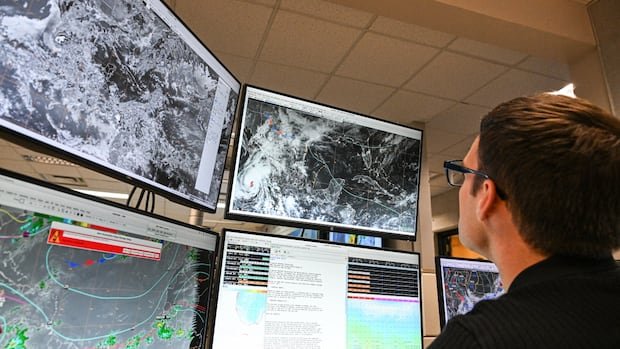An AI Revolution in Hurricane Forecasting
When post-tropical storm Fiona struck Peggy Savery’s cliffside residence in Port aux Basques, N.L., she had only minutes to evacuate before the storm hit. Fortunately, Savery managed to escape, but her home and belongings were lost to the ocean during the 2022 storm that ravaged Atlantic Canada and parts of the Caribbean.
Now residing farther from the coast, Savery remains vigilant when hurricanes or major storms loom on the horizon. She emphasizes the importance of preparedness, warning against complacency in the face of such natural disasters.
Experts are exploring the use of artificial intelligence (AI) to enhance current hurricane monitoring capabilities, acknowledging the need for further research and development in this area. AI integration is already underway in weather forecasting systems worldwide, including at prominent institutions like the U.S. National Hurricane Center and the European Centre for Medium-Range Weather Forecasts.
According to meteorologist Jim Abraham, founder of the Canadian Hurricane Centre, AI represents the next phase of transformation in meteorology, offering promising advancements in storm prediction accuracy. Richard Turner, part of a team at Cambridge University behind the AI-driven Aardvark Weather system, highlights the system’s ability to predict weather patterns efficiently by analyzing extensive historical data.
While AI excels in tracking the path of hurricanes, it still faces challenges in accurately predicting storm intensity, such as wind speeds. Turner emphasizes the ongoing need for improvement in this aspect to enhance response strategies for approaching hurricanes.
Despite AI’s rapid evolution in forecasting technology, experts caution against expecting AI to entirely replace traditional forecasting methods. Both approaches complement each other, with AI relying on data derived from conventional forecasts for optimal performance. Turner underscores the importance of rigorous testing and evaluation over several years to ensure the reliability and operational readiness of AI-driven forecasting systems.
However, the progress of AI development in this field is at risk due to potential budget cuts affecting climate organizations, such as the National Oceanic and Atmospheric Administration in the U.S. These cuts could impede the collection of crucial data necessary for training AI systems, potentially hindering the advancement of hurricane forecasting capabilities.
With the potential promise of AI in storm prediction, there is hope that individuals like Peggy Savery, who reside in vulnerable areas prone to severe storms, can benefit from improved forecasting accuracy for better preparedness and mitigation measures. Turner stresses the urgency of advancing forecasting systems to enhance readiness and response efforts in the face of future natural disasters.

